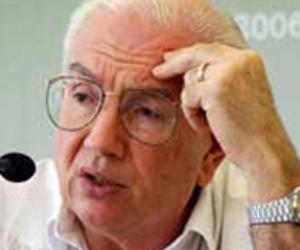Ex economy minister publishes book
- Submitted by: manso
- Business and Economy
- 08 / 11 / 2011

José Luis Rodríguez, minister of economy from 1995 to 2009, published a book providing an insider’s view of half a century of Cuba’s economic history and its economic future.
Since 1959, the Cuban economy has “achieved a favorable performance” with an average annual GDP growth rate of 3.3 percent, despite the “relentless blockade,” Rodríguez concludes, according to Web site Cubahora. In recent interviews — the global economic crisis aside — Rodríguez has blamed mainly U.S. sanctions for Cuba’s current financial distress.
But more than anything, Cuba has formed an “invaluable human capital” and contributed to the development of other nations, Rodríguez contended in a presentation of his book before economists in Havana.
“From 1960 to 2008, more than 200,000 Cubans worked in other countries, and the cost of this development aid approaches 2 percent of the national GDP,” Rodríguez said, according to Cubahora. “This number is three times higher than the 0.7-percent benchmark suggested by the United Nations.”
He defended state property as central to these achievements, and said it will continue to be a “determining” factor, after an opening towards private forms of property has been fully implemented.
“There must be a level of resource and management concentration that is sufficiently centralized to achieve a development process,” he said, according to Cubahora.
Notas Sobre la Economía Cubana consists of essays about the economic policies of three different periods between 1959 and 2009. Along the way, Rodríguez unearths new details about episodes such as the economic policy debates between Che Guevara and Carlos Rafael Rodríguez, the record sugar harvest of 1970, and the “Special Period,” and analyzes the planning processes and Cuba’s economic interaction with the Soviet Union and later Russia.
Rodríguez, 65, has a doctorate in economics from the Soviet Academy of Sciences. He is now a consultant for the Centro de Investigaciones de Economía Mundial (CIEM) in Havana.
Source: www.cubastandard.com/2011/08/11/ex-economy-minister-publishes-book/
Comments